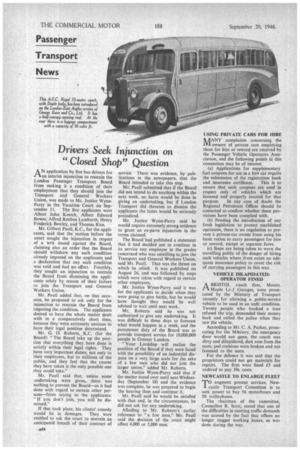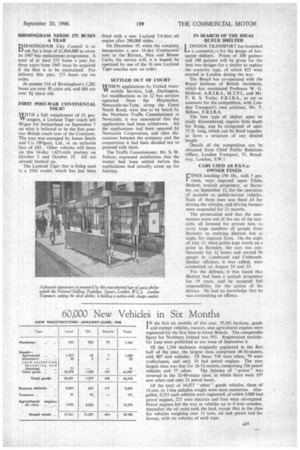Drivers Seek Injunction on "Closed Shop" Question
Page 46

Page 47

If you've noticed an error in this article please click here to report it so we can fix it.
AN application by five bus drivers for an interim injunction to restrain the London Passenger Transport Board from making it a condition of their employment that they should join the Transport and General Workers Union, was made to Mr. Justice WynnParry in the Vacation Court on Sep
tember 11. The five applicants were Albert John Keetch, Albert Edward Bowes, Alfred Reuben Lambarth, Henry Frederick Bewley, and Thomas Rice.
Mr. Gilbert Paull, K.C., for the applicants, said tbat the motion before the court sought the injunction in respect of a writ issued against the Board, claiming also an order that the Board should withdraw any such condition already imposed on the applicants and a declaration that any such condition was void and had no effect. Fourthly, they sought an injunction to restrain the Board from dismissing the applicants solely by reason of their failure to join the Transport and General Workers Union.
Mr. Paull added that, on that occasion, he proposed to ask only for the injunction to restrain the Board from imposing the. condition. The applicants desired to have the whole matter dealt with in a comparatively short time, because they were extremely anxious to have their legal position determined.
Mr. G. D. Roberts,,K.C. (for the Board): "The Board take up the position that everything they have done is strictly within their legal rights. They have very important duties, not only to their employees, but to millions of the public, and they feel that the course they have taken is the only possible one they could take."
Mr. Paull said that, unless some undertaking were given, there was nothing to prevent the Board—as it had done with regard to certain other persons—from saying to the applicants: " If you don't join, you will be dismissed."
If that took place, his clients' remedy would be in damages. They were entitled to ask the court to restrain an anticipated breach of their contract of service. There was evidence, by publications in the newspapers, that the Board intended to take this step.
Mr. Paull submitted that if the Board did not intend to do anything within the next week, no harm would be done in giving an undertaking, but if London Transport did threaten to dismiss the applicants the latter would be seriously prejudiced.
Mr. Justice Wynn-Parry said he would require extremely strong evidence to grant an ex-parte injunction in the terms claimed.
The Board had published a statement that it had decided not to continue in its service any employee in the grades concerned who was unwilling to join the Transport and General Workers Union, said Mr. Paull. That was the threat on which he relied. It was published on August 26, and was followed by steps which were taken with regard to certain other employees, Mr. Justice Wynn-Parry said it was for the applicants to decide when they were going to give battle, but he would have thought they would be well advised to wait until next week.
Mr. Roberts said he was not authorized to give any undertaking. It was difficult in these days to forecast what would happen in a week, and the paramount duty of the Board was to provide transport service for 10,000,000 people in Greater London.
"Your Lordship will realize the position of the Board if they were faced with the possibility of an industrial dispute on a very large scale for the sake of a few men who did not join the larger anion," added Mr. Roberts.
Mr. Justice Wynn-Parry said that if the matter stood over until next Wednes day (September 18) and the evidence was complete, he was prepared to begin the hearing then and continue it.
Mr. Paull said he would be satisfied with that and, in the circumstances, he did not ask for any undertaking.
Alluding to Mr. Roberts's earlier reference to "a few men," Mr. Paull said the decision of the court might affect 4,000 or 5,000 men. USING PRIVATE CARS FOR HIRE IUTANY complaints concerning • the nil owners of private cars employing these for hire or reward are received by the Passenger Vehicle Operators Association, and the following points in this connection may be of interest.
(a) Applications for supplementary fuel coupons for use in a hire car require the submission of the registration book and insurance certificate. This is to ensure that such coupons are used in respect only of vehicles which are licensed and properly insured for that purpose. In any case of doubt the Regional Petroleum Officer should be contacted to confirm whether these provisions 'have been complied with.
(b) Pending the introduction of any fresh legislation to protect established operators, there is no regulation to prevent a private-car owner from using his basic ration to carry passengers for hire or reward, except at separate fares.
(c) Steps are being taken to warn the travelling public of the danger of hiring such vehicles where there exists no adequate insurance policy to cover the risk of carrying passengers in this way.
VEHICLE DILAPIDATED: OPERATOR FINED
A BRISTOL coach firm, Messrs. Maple Le.t Garages, were prosecuted by the Ministry of Transport recently for allowing a public-service vehicle to be used in an unfit condition. Twenty people who booked a tour refused the trip, demanded their money back and called the police when they saw the vehicle.
According to Mr. C. A. Parker, prosecuting for the Ministry, the emergency door would not open, the coach was dirty and dilapidated, dust rose from the seats, and cushions were broken and not fastened to the seats.
For the defence it was said that the proprietors could not get materials for repairs. The firm were fined £5 and ordered to pay 10s. costs.
NEWCASTLE TO ENLARGE FLEET
TO augment present services, Newcastle Transport Committee is to seek power to buy 56 motorbuses and 50 trolleybuses.
The chairman of the committee, Councillor R. Scott, stated that one of the difficulties in meeting traffic demands was caused by the fact that offices no longer stagger working hours, as was done during the war. BIRMINGHAM NEEDS 275 BUSES A YEAR
BIRMINGHAM City Council is to Lask for a loan of £1,064,000 to cover its 1947 bus replacement programme. A total of at least 275 buses a year for three years from 1947 must be acquired if the fleet is to be maintained. For delivery this year, 175 buses are on order.
At present 316 of Birmingham's 1,202 buses are over 10 years old, and 684 are over 8i years old.
FIRSTPOST-WAR CONTINENTAL TOUR?
MTH a full complement of 31 pasVT sengers, a Leyland Tiger coach left Wigan for Switzerland on September 7 on what is believed to be the first postwar British coach tour of the Continent. The tour was arranged by lames Smith and Co. (Wigan), Ltd.. at an inclusive fare of £45. Other vehicles will leave on this I4-day 1,625-mile journey on October 5 and October 19. All are already booked up.
The Leyland Tiger that is being used is a 1936 model, which has just been fitted with a new Leyland 7.4-litre oil engine after 200,000 miles.
On December 19, when the company inaugurates a new 14-day Continental tour to the Riviera, Nice and Monte Carlo, the service will, it is hoped, be operated by one of the 16 new Leyland Tiger coaches now on order.
SETTLED OUT OF COURT
WHEN applications by United AutoVV mobile Services, Ltd., Darlington, for modifications to its 22 bus services operated from the Haymarket. Newcast le-on-Tyne, along the G rent North Road, were due to be heard by the Northern Traffic Commissioner at Newcastle, it was announced that the applications had been withdrawn. All the applications had been opposed by Newcastle Corporation, and after discussions between the company and the corporation it had been decided not to proceed with them.
The Traffic Commissioner, Mr. S. W. Nelson, expressed satisfaction that the matter had been settled before the applications had actually come up for hearing.
IN SEARCH OF THE IDEAL QUEUE SHELTER
ONDON TRANSPORT has launched 1.a c.ornpetiti.o for the design of busqueue shelters. Prizes of 300 guineas and 100 guineas will be given for the best two designs for a shelter to replace the austerity type, of which 825 were erected in London during the war.
The Board has co-operated with the Royal Institute of British Architects, which .has nominated Professor W. G. Holford, A.R.I.B.A., M.T.P.I., and Mr. F. R. S. Yorke, F.R.1.B.A., to act as assessors for the competition, with London Transport's own architect, Mr. T. Bilbow, F.R.I.B.A.
The best type of shelter must be easily dismembered, require little depth for fixing, and be composed of units 12 ft. long, which can be fitted together to form a structure of any desired length.
Details of the competition can be obtained from Chief Public Relations Officer, London Transport, 55, Broadway, London, S.W.1.
CABS USED AS P.S.V.s: OWNER FINED
FINES totalling £90 10s., with 5 gns. costs, were imposed upon Elisha Beckett. taxicab proprietor, at Barnsley, on September 12, for the operation of taxicabs as public-service vehicles. Each of three men was fined £4 for driving the vehicles, and driving licences were suspended for 12 months.
The prosecution said that the summonses arose out of the use of the taxicabs, all licensed for private hire, to carry large numbers of people from Barnsley to outlying districts late at night, for separate fares. On the night of July 13, when police kept watch on a point in Barnsley, the cars ran continuously for If hours and carried 96 people la Lundwood and Cudworth. Similar offences, it was added, were committed on August 24 and 25.
For the defence, it was stated that Beckett had been a taxicab proprietor for 19 years, and he accepted full responsibility for the action of his drivers. He had no knowledge that he was committing an offence.




































































